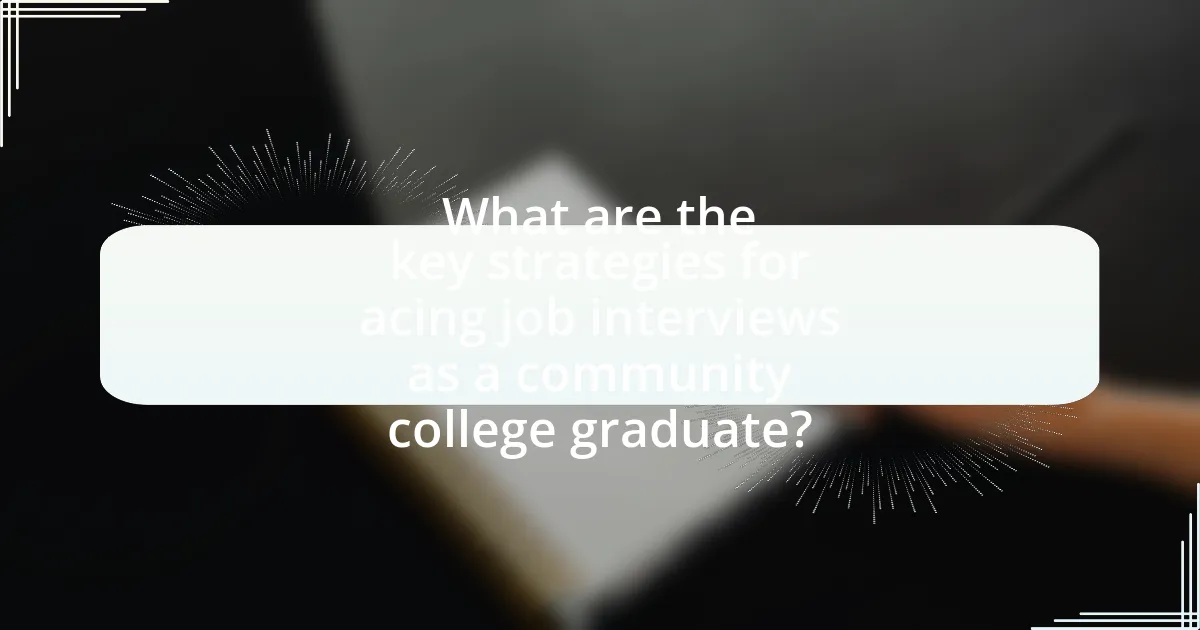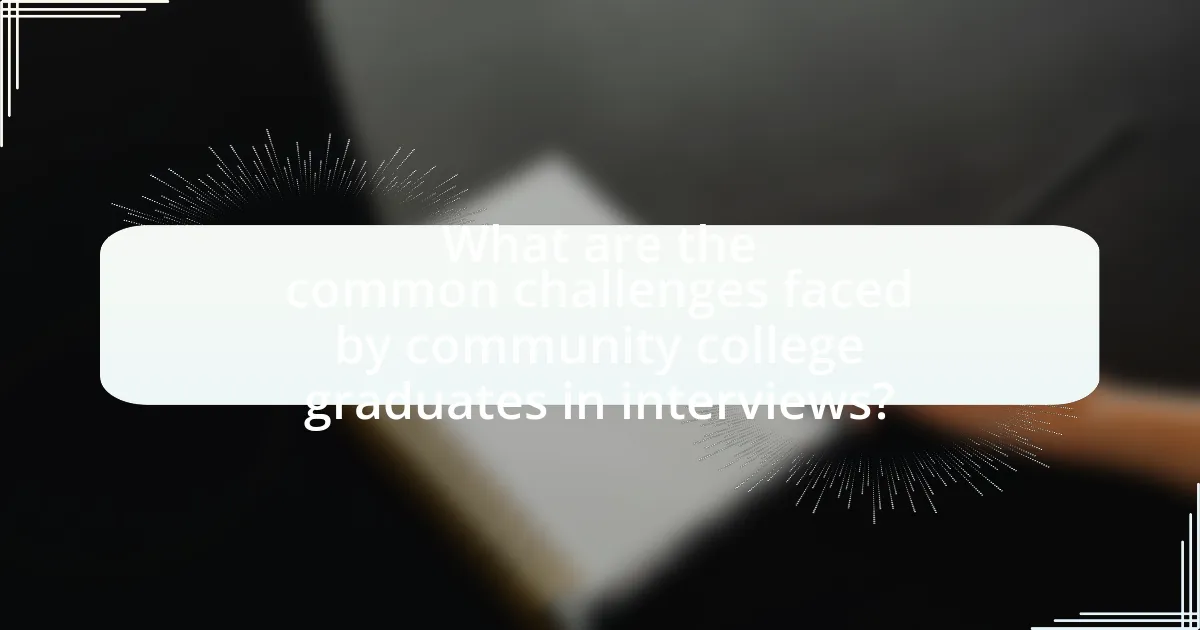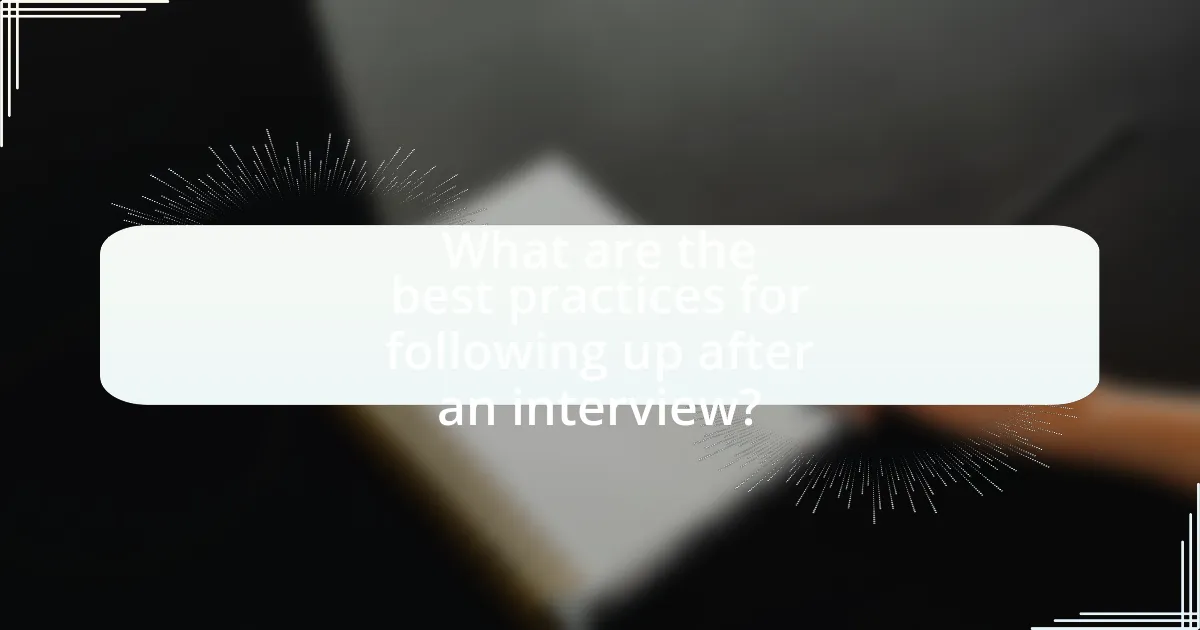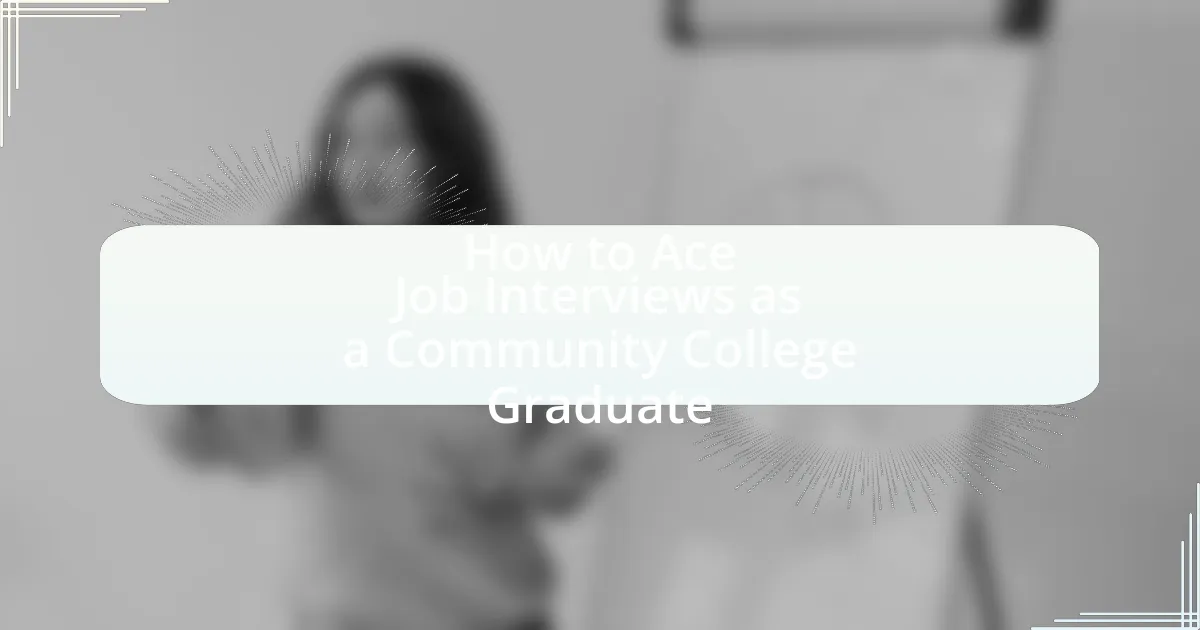The article focuses on strategies for community college graduates to excel in job interviews. Key strategies include thorough preparation, effective communication, and showcasing relevant skills. It emphasizes the importance of researching the company, practicing common interview questions, and tailoring resumes to highlight community college experiences. Additionally, the article addresses common challenges faced by graduates, such as perceived skill gaps and lack of confidence, while providing actionable tips for overcoming these obstacles. Networking and follow-up practices after interviews are also discussed as essential components of the job search process.

What are the key strategies for acing job interviews as a community college graduate?
Key strategies for acing job interviews as a community college graduate include thorough preparation, effective communication, and showcasing relevant skills. Preparation involves researching the company and understanding the job role, which enhances confidence and allows for tailored responses. Effective communication is crucial; practicing common interview questions and articulating experiences clearly can significantly impact the interviewer’s perception. Additionally, showcasing relevant skills, such as technical abilities or soft skills gained during community college, demonstrates value to potential employers. According to a survey by the National Association of Colleges and Employers, 73% of employers prioritize communication skills, highlighting the importance of this strategy.
How can preparation enhance my interview performance?
Preparation enhances interview performance by increasing confidence and improving responses to questions. When candidates thoroughly research the company, understand the job role, and practice common interview questions, they can articulate their skills and experiences more effectively. Studies show that well-prepared candidates are perceived as more competent and are 50% more likely to receive job offers compared to those who are unprepared. This preparation allows candidates to tailor their answers to align with the company’s values and needs, demonstrating a strong fit for the position.
What specific research should I conduct about the company?
Conduct research on the company’s mission, values, and recent news. Understanding the company’s mission and values helps align your responses during the interview with what the company stands for, which is crucial for demonstrating cultural fit. Additionally, reviewing recent news articles or press releases about the company can provide insights into its current projects, challenges, and achievements, allowing you to ask informed questions and show genuine interest. For example, if a company recently launched a new product or service, referencing that in your interview can illustrate your proactive approach and knowledge about the organization.
How can I practice common interview questions effectively?
To practice common interview questions effectively, engage in mock interviews with peers or mentors who can provide constructive feedback. This method allows you to simulate real interview conditions, helping you to refine your responses and improve your confidence. Research indicates that practicing in a realistic setting can enhance performance; a study published in the Journal of Applied Psychology found that individuals who participated in mock interviews showed a 30% improvement in interview performance compared to those who did not. Additionally, recording your practice sessions can help you identify areas for improvement, such as body language and clarity of answers.
What role does my resume play in the interview process?
Your resume serves as a critical tool in the interview process by summarizing your qualifications, experiences, and skills relevant to the job. It acts as a first impression for employers, guiding their decision to invite you for an interview based on the alignment of your background with the job requirements. Research indicates that 75% of resumes are never seen by human eyes due to applicant tracking systems filtering candidates based on keywords and qualifications, highlighting the importance of a well-crafted resume in securing an interview opportunity.
How can I tailor my resume to highlight my community college experience?
To tailor your resume to highlight your community college experience, focus on emphasizing relevant coursework, skills acquired, and any extracurricular activities or projects that demonstrate your capabilities. Include specific courses that align with the job you are applying for, showcasing how they provided you with practical knowledge and skills. For instance, if you completed a project in a team setting, detail your role and the outcome to illustrate teamwork and problem-solving abilities. Additionally, mention any certifications or awards received during your time at community college, as these can further validate your qualifications. Highlighting these elements effectively demonstrates to potential employers that your community college experience has equipped you with valuable skills and knowledge relevant to the job market.
What are the essential elements of a strong resume for job interviews?
A strong resume for job interviews includes clear contact information, a professional summary, relevant work experience, education, skills, and certifications. Contact information should be prominently displayed at the top, ensuring potential employers can easily reach the candidate. The professional summary provides a brief overview of the candidate’s qualifications and career goals, tailored to the specific job. Relevant work experience should be listed in reverse chronological order, highlighting achievements and responsibilities that align with the job description. Education details should include degrees obtained, institutions attended, and graduation dates, particularly emphasizing any relevant coursework or honors. Skills should be specific to the job and include both hard and soft skills, while certifications can enhance credibility and demonstrate specialized knowledge. According to a study by the National Association of Colleges and Employers, 88% of employers look for candidates with relevant experience, making it crucial to showcase applicable skills and achievements effectively.
Why is networking important for community college graduates?
Networking is important for community college graduates because it facilitates connections that can lead to job opportunities and career advancement. By engaging with professionals in their field, graduates can gain insights into industry trends, access job openings that may not be advertised, and receive mentorship from experienced individuals. Research indicates that approximately 70% of jobs are found through networking, highlighting its critical role in the job search process. Additionally, networking helps graduates build relationships that can provide support and guidance as they navigate their early careers.
How can I leverage alumni networks for job opportunities?
To leverage alumni networks for job opportunities, actively engage with alumni through networking events, social media platforms like LinkedIn, and alumni associations. By attending events, you can build relationships with alumni who may provide job leads or referrals. Research indicates that 70% of jobs are found through networking, highlighting the importance of these connections. Additionally, alumni often share insights about their industries and companies, which can enhance your interview preparation and job search strategies.
What strategies can I use to expand my professional network?
To expand your professional network, actively participate in industry events, workshops, and conferences relevant to your field. Engaging in these activities allows you to meet professionals, share knowledge, and establish connections that can lead to job opportunities. According to a LinkedIn survey, 85% of jobs are filled through networking, highlighting the importance of building relationships in your industry. Additionally, utilizing social media platforms like LinkedIn to connect with peers and industry leaders can further enhance your networking efforts, as these platforms facilitate ongoing communication and collaboration.

What are the common challenges faced by community college graduates in interviews?
Community college graduates commonly face challenges in interviews such as lack of confidence, limited networking opportunities, and perceived skill gaps. Lack of confidence often stems from less experience compared to four-year college graduates, which can hinder their ability to articulate their qualifications effectively. Limited networking opportunities can result from smaller alumni networks and fewer connections in professional fields, making it harder for graduates to secure interviews. Additionally, perceived skill gaps arise when employers assume that community college graduates may not possess the same level of expertise or training as those from traditional universities, impacting their competitiveness in the job market.
How can I overcome the lack of experience in interviews?
To overcome the lack of experience in interviews, focus on highlighting transferable skills and relevant coursework. Community college graduates often possess skills gained through projects, internships, or part-time jobs that can be applicable to the desired role. For instance, if you have worked on group projects, emphasize teamwork and communication skills. Additionally, research shows that 85% of job success comes from soft skills, such as problem-solving and adaptability, which can be developed in various settings, including academic environments. Prepare specific examples that demonstrate these skills to effectively convey your potential to employers despite limited direct experience.
What transferable skills can I emphasize during the interview?
During the interview, you can emphasize skills such as communication, teamwork, problem-solving, adaptability, and time management. Communication skills are crucial as they demonstrate your ability to convey ideas clearly and effectively, which is supported by studies showing that effective communication enhances workplace productivity. Teamwork skills highlight your capability to collaborate with others, a necessity in most job environments, as research indicates that collaborative teams often outperform individual efforts. Problem-solving skills showcase your ability to analyze situations and develop solutions, which is essential in dynamic work settings. Adaptability reflects your readiness to adjust to new challenges, a trait increasingly valued in fast-paced industries. Lastly, time management skills illustrate your ability to prioritize tasks and meet deadlines, a key factor in achieving organizational goals.
How can I address gaps in my work history effectively?
To address gaps in your work history effectively, acknowledge the gaps honestly and frame them positively. Highlight any relevant skills or experiences gained during the gap, such as volunteering, education, or personal projects. For instance, if you took time off for caregiving, emphasize skills like time management and multitasking that are applicable to the job. Research indicates that 60% of employers value honesty about work history, which can enhance your credibility. By preparing a concise explanation and focusing on your growth during the gap, you can present yourself as a strong candidate despite the absence of continuous employment.
What misconceptions do employers have about community college graduates?
Employers often mistakenly believe that community college graduates lack the necessary skills and knowledge compared to those with four-year degrees. This misconception overlooks the fact that community colleges provide rigorous training and hands-on experience in various fields, equipping graduates with practical skills that are highly relevant to the job market. According to the American Association of Community Colleges, nearly 80% of community college students are enrolled in programs that lead directly to employment, demonstrating their preparedness for the workforce. Additionally, many community college graduates excel in technical and vocational areas, filling critical skill gaps in industries such as healthcare and technology.
How can I counter stereotypes during the interview process?
To counter stereotypes during the interview process, candidates should proactively highlight their skills and experiences that directly relate to the job. This approach allows candidates to shift the focus from preconceived notions to their qualifications. For instance, a study by the American Psychological Association indicates that emphasizing relevant achievements can mitigate bias, as it provides concrete evidence of capability. Additionally, candidates can prepare specific examples that demonstrate their problem-solving abilities and teamwork, which can further challenge stereotypes by showcasing their competence and professionalism.
What positive attributes should I highlight to change perceptions?
Highlight adaptability, strong work ethic, and practical skills to change perceptions. Adaptability demonstrates your ability to learn and thrive in diverse environments, which is crucial in today’s fast-paced job market. A strong work ethic reflects your commitment and reliability, qualities that employers value highly. Practical skills, often gained through hands-on experiences in community college programs, showcase your readiness to contribute effectively from day one. These attributes are supported by studies indicating that employers prioritize soft skills and practical experience, making them essential for standing out in job interviews.

What are the best practices for following up after an interview?
The best practices for following up after an interview include sending a thank-you email within 24 hours, reiterating your interest in the position, and highlighting key points from the interview. This approach demonstrates professionalism and appreciation, which can positively influence the hiring manager’s perception. Research indicates that timely follow-ups can increase the likelihood of being remembered by interviewers, as candidates who express gratitude are often viewed more favorably. Additionally, maintaining a polite and concise tone in your communication reinforces your suitability for the role.
How should I craft a thank-you note after an interview?
To craft a thank-you note after an interview, begin by addressing the interviewer by name and expressing gratitude for the opportunity to interview. This establishes a personal connection and shows appreciation. Next, briefly mention a specific topic discussed during the interview to reinforce your interest and engagement. For example, you could reference a project or value of the company that resonates with you. Finally, conclude by reiterating your enthusiasm for the position and expressing hope for future communication. Research indicates that sending a thank-you note can enhance your chances of receiving a job offer, as it demonstrates professionalism and courtesy.
What key points should I include in my thank-you note?
Key points to include in your thank-you note are expressing gratitude, mentioning specific details from the interview, and reiterating your interest in the position. Expressing gratitude shows appreciation for the interviewer’s time and consideration. Mentioning specific details, such as a topic discussed during the interview, personalizes the note and reinforces your engagement. Reiterating your interest in the position confirms your enthusiasm and suitability for the role. These elements create a strong, memorable impression that can positively influence the hiring decision.
When is the best time to send a follow-up message?
The best time to send a follow-up message is typically within 24 to 48 hours after the interview. This timeframe allows the interviewer to recall the conversation while demonstrating your enthusiasm and professionalism. Research indicates that timely follow-ups can significantly enhance your chances of making a positive impression, as candidates who follow up promptly are often perceived as more engaged and proactive.
What should I do if I don’t hear back after an interview?
If you don’t hear back after an interview, follow up with a polite email to the interviewer or hiring manager. This email should express your continued interest in the position and inquire about the status of your application. Research indicates that 70% of employers appreciate follow-up communication, as it demonstrates enthusiasm and professionalism. If you still do not receive a response after a week or two, consider moving on and applying to other opportunities, as prolonged silence may indicate that you were not selected.
How can I politely inquire about my application status?
To politely inquire about your application status, you should send a brief and respectful email to the hiring manager or recruiter. In your message, clearly state your name, the position you applied for, and express your continued interest in the role while asking for any updates regarding your application. This approach is effective as it demonstrates professionalism and respect for the recipient’s time.
What steps can I take to stay positive during the waiting period?
To stay positive during the waiting period after job interviews, engage in activities that promote mental well-being and maintain a proactive mindset. Practicing mindfulness techniques, such as meditation or deep-breathing exercises, can reduce anxiety and enhance focus. Additionally, setting small, achievable goals related to your job search, like networking or updating your resume, can provide a sense of accomplishment and keep you motivated. Research indicates that maintaining a positive outlook can improve resilience and overall mental health, which is crucial during uncertain times.
What are the top tips for community college graduates to excel in job interviews?
Community college graduates can excel in job interviews by thoroughly preparing, showcasing relevant skills, and demonstrating confidence. Preparation involves researching the company and understanding the job role, which allows graduates to tailor their responses effectively. Highlighting specific skills gained from coursework or internships, such as teamwork or technical abilities, can make candidates stand out. Additionally, practicing common interview questions and conducting mock interviews can enhance performance. Confidence can be conveyed through body language and clear communication, which are crucial in making a positive impression. These strategies are supported by studies indicating that preparation and self-presentation significantly influence hiring decisions.

Leave a Reply